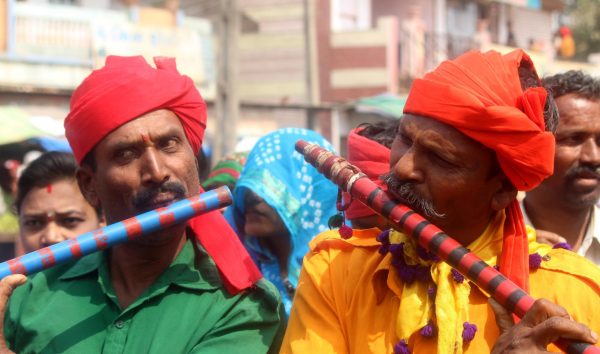Bringing Gothic Thrillers Back, “Us” Breaks Box Office
Editor’s Note: This review may contain spoilers of the movie Us.
Jordan Peele’s Us is a gripping horror film that dabbles in a variety of uncanny, terror-inducing devices — doppelgängers, scientific experiments gone wrong, and darkly creative scenes of pursuit, stabbing, and bloodshed.
The plot follows Adelaide Wilson, played phenomenally by Lupita Nyong’o, as she navigates the childhood trauma of finding a little girl who looks exactly like her in an abandoned mirror maze. Returning to the location where this took place — this time as an adult with a family of her own — she experiences a sense of foreboding that her doppelgänger is coming to get her. Adelaide’s fears come true, when not just her double, now fully grown, returns, but doubles of her husband and two children all show up at their front porch, baying for blood.
Later in the film, we discover that it’s not just the Wilsons who are unfortunate enough to witness these horrors come to life. Millions of Americans face off against and are murdered by an entire army of American doppelgängers, the Tethered, who emerge from the inhumane conditions of their homes in underground tunnels — which actually exist in the continental U.S.
While the production of the film is extremely engaging as we descend through a literal and metaphorical rabbit hole, Peele’s “Easter eggs” tend to be heavy-handed. For example, the mask belonging to Adelaide’s son Jason, which seems to represent the characters’ duality, and his toy ambulance, which hints at the getaway car used in the finale, both seem like unnecessary foreshadowing in an otherwise brilliantly-told story.
However, Nyong’o’s performance as Adelaide, as well as her double, Red, is genuinely awe-inspiring. Her portrayal of each character evokes both fear and sympathy, a truly heroic feat to accomplish while constantly engaging in extreme violence. Her line, “Be careful” and the unsettling smiles and laughs peppered tastefully throughout the film continue to induce shivers down my spine days after watching the film. Her acting is beautifully nuanced, with lithe, spider-like movements, unnerving head tilts, unblinking eyes, and two completely distinct voices for her two characters.
It’s worth noting that Nyong’o has received a lot of criticism regarding the breathy, stilted voice she used for Red’s character, which she mentioned in an interview with Variety was inspired by a condition called spasmodic dysphonia, a larynx disorder that can sometimes be the result of experiencing trauma. Jennifer Laszlo Mizrahi, president of nonprofit activist group RespectAbility, condemned Nyong’o for this acting choice. “Connecting disabilities to characters who are evil further marginalizes people with disabilities, who also have significant abilities and want to contribute to their communities just like anyone else,” she said in an interview with The Guardian. Nyong’o has sincerely apologized for offending anyone with the condition, stressing that it was never her intention to vilify a disability.
The most chilling aspect of the film, surprisingly, is the question the film raises about who is truly “evil.” Is it the bloodthirsty Tethered, who are merely avenging decades of being deprived, forgotten, and mistreated? Or the privileged people who live happy, full lives in ignorance of this suffering? Us grapples with the dichotomy of ‘us versus them’ and the human rights of each while raising important sociopolitical issues around the demonization of oppressed communities.
These issues of oppression are particularly reflective of American race and class politics, bringing forward the interpretation mentioned in Peele’s interview with Yahoo Entertainment: The film mirrors the U.S., especially through its constant reference to the 1980s Hands Across America charity event protesting hunger, which inspires the violence by the Tethered. The film critiques not only how poorly the U.S. treats underprivileged groups, but also the nation’s insistence on sugar-coating its horrors with capitalistic production.
Interestingly, there isn’t a single gun showcased in such a violent movie about America. The characters in the film use scissors, golf clubs, baseball bats, and boats to murder one another, but not even an extra is seen using a gun. Gun culture’s conspicuous absence suggests that American society is violent enough even without firearms.
I must also mention the presence of brief but memorable comedic moments in the film, mostly courtesy of Adelaide’s husband Gabe Wilson (Winston Duke). His weird, stereotypically masculine obsession with his motorboat and general disbelief at all the apocalyptic events of the film are entertaining and much-needed moments of relief in an otherwise tense, hypnotizing thriller.
Us is already a box office success and has grossed over $176 million worldwide within a week of release. It has also surpassed advance ticket sales from other films in the genre, such as A Quiet Place and Peele’s own Get Out. However, Us is definitely not for everyone. Despite its important criticism of American society, incredible acting, and portrayal of strong Black women, it is also a grisly and harrowing experience. It is certainly a cinematic masterpiece, but one must go into this film prepared to relive its terrifying scenes over and over again. Particularly because the horror in the film is not confined to the dark — the doppelgängers are more than happy to kill you in broad daylight — since watching it, I have spent the last week masochistically listening to the film’s haunting soundtrack, “I Got 5 On It,” and imagining my double taking over my life. So, be warned and brace yourself.










